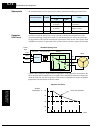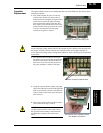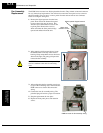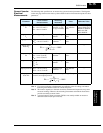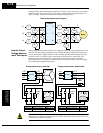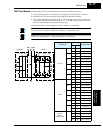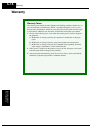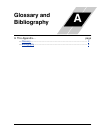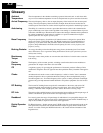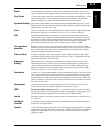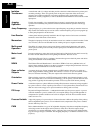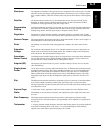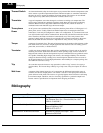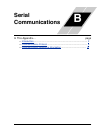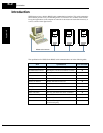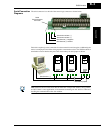
Glossary
Appendix A
A–2
Glossary
Ambient
Temperature
The air temperature in the chamber containing a powered electronic unit. A unit’s heat sinks
rely on a lower ambient temperature in order to dissipate heat away from sensitive electronics.
Arrival Frequency The arrival frequency refers to the set output frequency of the inverter for the constant speed
setting. The arrival frequency feature turns ON an output when the inverter reaches the set
constant speed. The inverter has various arrival frequencies and pulsed or latched logic options.
Auto-tuning The ability of a controller to execute a procedure that interacts with a load to determine the
proper coefficients to use in the control algorithm. Auto-tuning is a common feature of process
controllers with PID loops. Hitachi inverters feature auto-tuning to determine motor parameters
for optimal commutation. Auto-tuning is available as a special command from a digital
operator panel. See also digital operator panel.
Base Frequency The power input frequency for which an AC induction motor is designed to operate. Most
motors will specify a 50 to 60 Hz value. The Hitachi inverters have a programmable base
frequency, so you must ensure that parameter matches the attached motor. The term base
frequency helps differentiate it from the carrier frequency. See also carrier frequency and
frequency setting.
Braking Resistor An energy-absorbing resistor that dissipates energy from a decelerating load. Load inertia
causes the motor to act as a generator during deceleration. See also four-quadrant operation
and dynamic braking.
Break-away
Torque
The torque a motor must produce to overcome the static friction of a load in order to start the
load moving.
Carrier
Frequency
The frequency of the constant, periodic, switching waveform that the inverter modulates to
generate the AC output to the motor. See also PWM.
CE A regulatory agency for governing the performance of electronic products in Europe. Drive
installations designed to have CE approval must have particular filter(s) installed in the applica-
tion.
Choke An inductor that is tuned to react at radio frequencies is called a “choke,” since it attenuates
(chokes) frequencies above a particular threshold. Tuning is often accomplished by using a
movable magnetic core. In variable-frequency drive systems, a choke positioned around high-
current wiring can help attenuate harmful harmonics and protect equipment. See also harmon-
ics.
DC Braking The inverter DC braking feature stops the AC commutation to the motor, and sends a DC
current through the motor windings in order to stop the motor. Also called “DC injection
braking,” it has little effect at high speed, and is used as the motor is nearing a stop.
DC Link The portion of the variable frequency drive between the input rectifiers and the output stages. It
delivers smoothed DC power to the control and output stages of the drive.
Deadband In a control system, the range of input change for which there is no perceptible change in the
output. In PID loops, the error term may have a deadband associated with it. Deadband may or
may not be desirable; it depends on the needs of the application.
Digital Operator
Panel
For Hitachi inverters, “digital operator panel” (DOP) refers first to the operator keypad on the
front panel of the inverter. It also includes hand-held remote keypads, which connect to the
inverter via a cable. Finally, the DOP Professional is a PC-based software simulation of the
keypad devices.



